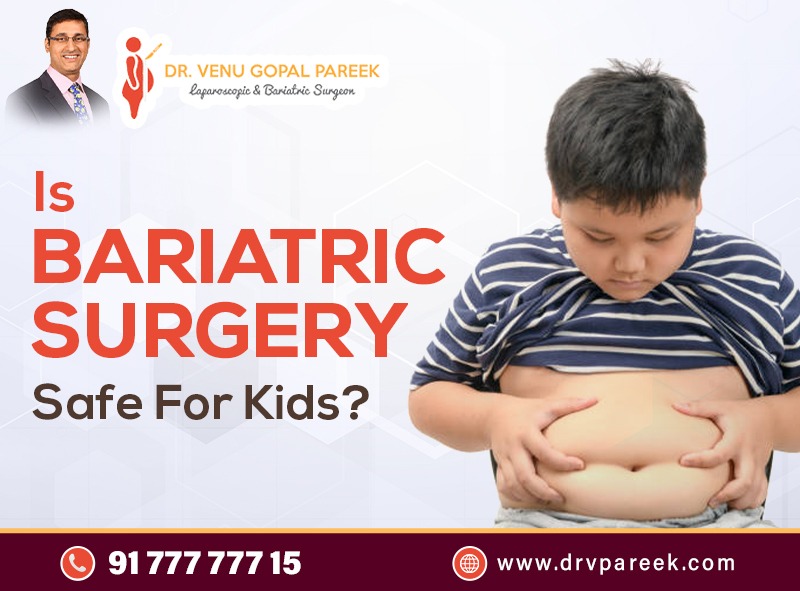
Is Bariatric Surgery safe for kids?
Obesity in children and teenagers is one of the most pressing public health problems, especially in the present generation. Over the past few decades, childhood obesity has increased steadily. About 1 in 10 children around the world are at risk of obesity due to their unhealthy dietary habits, sedentary lifestyles, genetic predispositions, and environmental influences.
Along with excess weight, childhood obesity might increase the risk of developing type 2 diabetes, cardiovascular disease, and musculoskeletal disorders.
Being overweight or obese as a child increases the likelihood of becoming obese in adulthood as well. Traditional weight loss methods might not produce the desired results for severely obese children; bariatric surgery is the other best option for weight management in those children.
Yes, lifestyle is very important, but many teens experience obesity and related complications even though they are living healthy lifestyles.
“Is bariatric surgery right for my kid?”
This question should primarily focus on eligibility and risks of having surgery. When it comes to treating kids with excess weight or extreme obesity, experts suggest a multidisciplinary approach. A thorough evaluation and thoughtful discussions about excess weight with pediatric specialists, surgeons, mental health professionals, and dietitians are very important to make a shared decision on whether to perform bariatric surgery.
In general, bariatric surgery is recommended for children:
Whose body-mass index (BMI) is ≥ 30 with obesity-related health complications.
Whose BMI is ≥ 35, even if they don’t have obesity-related health complications.
In addition to BMI, other factors to consider include whether bariatric surgery is the right choice for children and whether this is the right age. Experts say that bariatric surgery is not age-specific; people of any age can undergo this surgery depending on their general health and other factors; however, most scientific data suggests teens aged 13 years and older for girls and 15 years or older for boys have better benefits from it.
Furthermore, understanding the significance, risks, and benefits of bariatric surgery helps patients make the right choice for themselves, with the support of their family members and medical team.
Parents and patients must be willing to make necessary lifestyle changes along with a controlled diet that is necessary following surgery. The teen who is willing to undergo bariatric surgery should not drink alcohol or drugs for at least 12 months before and after surgery to gain optimum results.
The primary goal of this surgery is to enhance long-term health into adulthood.
Traditional Approaches vs. Bariatric Surgery
For children with severe obesity who have failed to achieve the desired weight loss through diet and exercise, bariatric surgery might be the last resort. Gastric bypass, sleeve gastrectomy, and adjustable gastric banding are the most popular bariatric procedures that alter the digestive process by reducing stomach size, resulting in significant weight loss after a few months. In adults, bariatric surgery is safe and results in significant weight loss, but when it comes to teenagers, some studies show these operations are safe and efficient; however, they are less well-established.
The research on the long-term effects on growth for teens who have undergone bariatric surgery shows limited results. The bodies of teenagers are still growing, so it is important to be mindful of getting sufficient nutrients during the recovery period following weight loss surgery.
We know certain bariatric surgeries change the way nutrients are absorbed, so teens and children who undergo weight-loss surgery might need to take certain vitamins and minerals orally.
Research and Guidelines
Safety and efficiency are the primary concerns when considering bariatric surgery in children because of complications like nutrient deficiencies, malabsorption, gastrointestinal issues, and psychological challenges. Even though the research supporting safety and efficiency is still evolving, several studies say that they have observed positive outcomes in terms of weight loss and improvement in obesity-related complications after bariatric surgery.
Professional institutions like the AAP (American Academy of Pediatrics) and the ASMBS (American Society for Metabolic and Bariatric Surgery) have provided certain guidelines to follow while considering a patient for bariatric surgery, which involves medical, nutritional, psychological, and surgical specialists.
The question “Is bariatric surgery safe for my child?” is complex and multifaceted. So, Dr. Venugopal Pareek, one of the best bariatric surgeons in Hyderabad, says that selecting the right patient and counselling are paramount when considering a weight loss surgery, especially for children. A comprehensive evaluation is critical for bariatric patients to evaluate their physical and psychological readiness. Additionally, patients and their families should be educated about the risks and benefits of the procedure so that they can make an informed decision.
It’s also highly important to note that any weight loss surgery is not a quick fix for obesity; it’s just a tool that you need to use properly to achieve desired weight loss and improve overall health.







